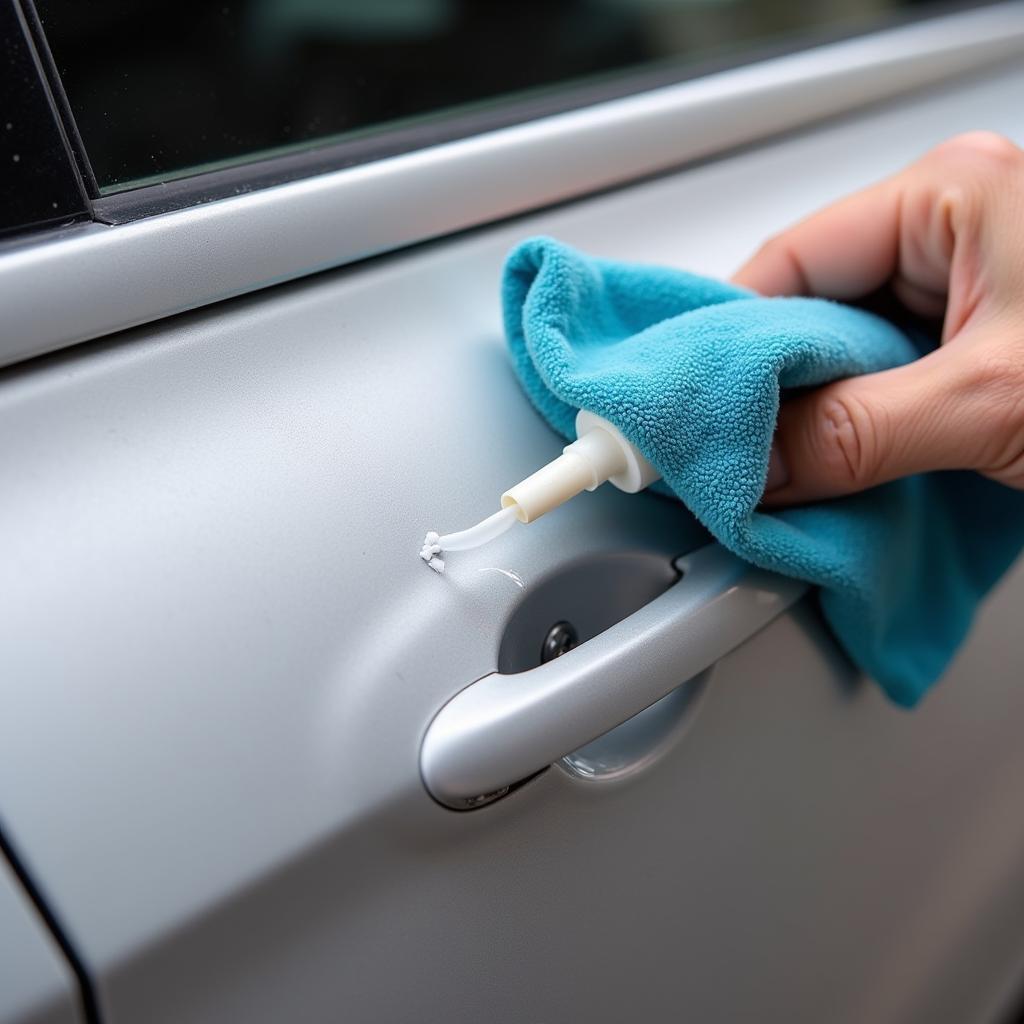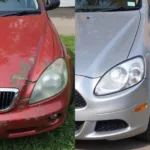Car paint scratch repair toothpaste is a popular DIY method for fixing minor scratches on your car’s paint. But does this seemingly magical solution actually work, or is it just an old wives’ tale? We’ll delve into the science behind this method, explore its effectiveness, and guide you through the proper application process. Learn the pros and cons, when to use it, and when to seek professional help.
Applying toothpaste to minor car paint scratches is a technique often touted as a quick and inexpensive fix. It can be an effective temporary solution for very superficial scratches, but understanding its limitations is crucial. Let’s examine how this method works (or doesn’t). Toothpaste contains mild abrasives that can level out minor imperfections on surfaces, much like how it cleans your teeth. These abrasives, such as hydrated silica, gently polish the clear coat, potentially reducing the visibility of light scratches. This makes it a potential solution for those faint scratches that appear more like scuffs. For deeper scratches that penetrate the clear coat or even the paint layer itself, toothpaste will offer little to no benefit. You should consider other repair options like touch-up paint or professional detailing in these instances. Seeking advice from a car repair specialist will ensure the best outcome.
Understanding Car Paint Scratches and Toothpaste Application
Knowing the types of scratches on your car is essential for determining the right approach. Scratches are categorized based on their depth, ranging from clear coat scratches to deep gouges exposing the bare metal. Toothpaste is generally only suitable for the most superficial clear coat scratches. Anything deeper will require how to repair scratched car paint.
Before you begin, thoroughly clean the scratched area with car wash soap and water. This removes dirt and debris that can interfere with the toothpaste application and potentially cause further scratching.
Applying Toothpaste to Car Paint Scratches: A Step-by-Step Guide
- Wash and dry the affected area.
- Apply a small amount of white, non-gel toothpaste to a soft, clean microfiber cloth.
- Gently rub the toothpaste onto the scratch using circular motions.
- After a few minutes of rubbing, wipe away the excess toothpaste with a clean, damp cloth.
- Inspect the scratch to see if its appearance has improved. You can repeat the process if necessary.
 Applying Toothpaste to a Car Scratch
Applying Toothpaste to a Car Scratch
Pros and Cons of Using Toothpaste for Car Scratch Repair
While using toothpaste can be a convenient and cheap temporary fix for minor scratches, it’s vital to weigh the pros and cons before attempting this method. On the plus side, it’s readily available, inexpensive, and easy to apply. However, the results are often temporary, it’s ineffective on deeper scratches, and improper application can potentially worsen the damage.
When Toothpaste Isn’t Enough: Alternative Repair Methods
For deeper scratches or when toothpaste doesn’t produce satisfactory results, other repair options are available. Repair small paint scratches car can involve using touch-up paint, scratch remover pens, or even professional detailing services. The best course of action depends on the severity of the damage and your budget.
Preventing Car Paint Scratches
Preventing scratches in the first place is always the best approach. Regularly washing and waxing your car creates a protective layer against minor abrasions. Be mindful of parking in tight spaces and avoid contact with abrasive materials. These preventive measures can save you time and money in the long run.
“Preventing scratches is always the best strategy. Regular washing and waxing not only keep your car looking great but also provide crucial protection against minor abrasions,” says renowned automotive detailing expert, David Miller.
The Verdict on Toothpaste for Car Scratch Repair
While toothpaste can sometimes minimize the appearance of very superficial scratches, it’s essential to have realistic expectations. It’s a temporary fix, not a permanent solution, and only effective for the most minor blemishes. For deeper scratches, how to repair scuffs on car paint will be necessary.
“Toothpaste offers a quick and readily available option for minimizing superficial imperfections. However, remember, its effectiveness is limited to extremely minor surface scratches,” advises automotive paint specialist, Sarah Chen.
In conclusion, car paint scratch repair toothpaste can be a handy quick fix for very light scratches, but it’s crucial to understand its limitations. For deeper scratches or more lasting results, exploring alternative repair methods is often necessary. By understanding the nature of car paint scratches and the proper application techniques, you can make informed decisions about the best course of action for your vehicle.
FAQ
-
Can I use any type of toothpaste?
- Use a plain white, non-gel toothpaste.
-
How long does the repair last?
- The results are usually temporary and may fade over time.
-
Will toothpaste damage my car’s paint?
- It shouldn’t if used correctly, but excessive rubbing could cause further damage.
-
Can I use toothpaste on deep scratches?
- No, toothpaste is only effective on very superficial clear coat scratches.
-
What are other options for repairing car scratches?
- Touch-up paint, scratch remover pens, and professional detailing are alternative options.
-
How can I prevent car scratches?
- Regularly wash and wax your car, avoid parking in tight spaces, and be careful around abrasive materials.
-
Should I consult a professional for car scratch repair?
- For deeper scratches or if you’re unsure about the best course of action, consulting a professional is recommended.
You might also find these articles helpful: repair scratched paint car bumper and repair paint scratches my car.
Need further assistance? Our 24/7 customer support team is ready to help! Contact us via WhatsApp: +1(641)206-8880 or Email: [email protected].


